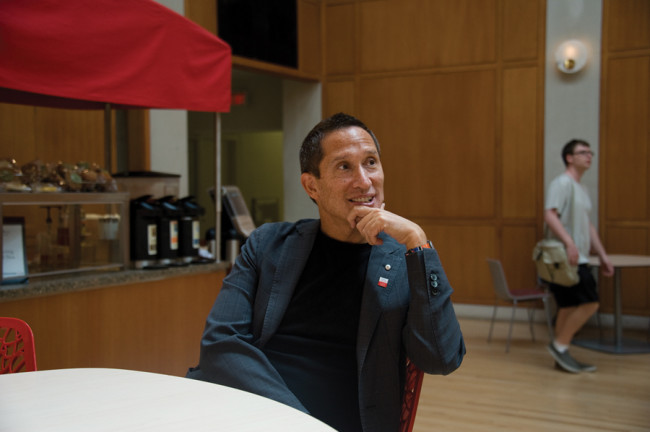
Meadows’ School of the Arts Dean Jose Bowen teaches naked.
Well, not literally naked.
Rather, teaching without using technology as a substitute for traditional
classroom learning.
“It’s just the idea that faculty-student interaction is what matters and that’s not necessarily lecturing,” Bowen said.
Teaching naked is Bowen’s signature teaching style and focus of his book, “Teaching Naked: How Moving Technology Out of Your College Classroom Will Improve Student Learning,” published in 2012.
“What I am trying to do is get faculty to just be human beings with students,” Bowen said. “Interact with them, be provocative, to disturb them, to have those interactions that really help student’s cognitive development.”
When Bowen was teaching at Georgetown University, he began experimenting with technology and how it could be applied outside of the classroom.
“The design of learning is more important than just the content,” Bowen said. “Most of what happens in learning is ‘Can you apply what you’re learning?’ Not ‘What can
you memorize?’”
Bowen’s classes vary in how content is presented. Some days his students play games, other days he has discussions.
“The data shows there is no worse way to teach than lecturing,” Bowen said. “Everything else you could do is better. So I say to people ‘What do you have to lose?’”
Bowen tries to put his students in real life situations.
For example, Bowen will assign a presentation for a New York meeting and then when a student comes to class, the student’s location is changed to Tokyo and the student will then have to rework his presentation for Tokyo in 15 minutes.
“I like suprises in class, because that’s how real life works,” Bowen said.
Bowen sees teachers as curators of learning tools. His activity-based learning pushes students to interact.
“It differed in the fact he brought in all kinds of speakers and made us interact a bunch with other majors,” said Connor Volz, sophomore music student.
Bowen received the national 2014 Frederic W. Ness Book Award from the Association of American Colleges and Universities (AAC&U;) for his work Jan. 24.
The Ness award, established in 1979, is given to a book that illuminates The Ness Award is given to a book that best illuminates the goals and practices of a contemporary liberal education.
“There were a lot of other books written about higher education that year,” Bowen said. “It was nice to be considered.”
Bowen will receive the award at an annual AAC&U; meeting in Washington, D.C.
“Bowen’s work is both compelling and useful,” said AAC&U; Committee Chair Dianne Harrison in a recent press release by the AAC&U.; “It also is very cognizant of the ideals and values of liberal education.”
Bowen is currently working on another book that discusses the cognitive improvement that college adds and how to maximize that improvement. Things like whether college is even essential to that change or if study aboard does affect social sensibility will be included in the book.
“My goal is to get people to think about ‘How can I better the learning experience for my students?’” Bowen said.














